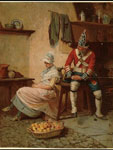What If...?: Reexamining the American Revolution
Question

What would have happened if the Patriots had been defeated in the War of Independence?
Answer
It is fascinating to consider what might have happened had the American patriots lost their war against Great Britain. Certainly British victory in the conflict was entirely plausible. Indeed, given the significant disparities in resources between the British and the colonists, such an outcome seemed not just possible but likely early on, and at numerous points during the conflict. The Patriots lacked a professional army, a central government, and a navy; the 13 colonies were geographically dispersed and lacked Britain’s political unity. The Patriots waged their war for independence against the world’s premier military and its most powerful empire, only a decade and a half removed from its great triumph over France in the Seven Years’ War.
It is impossible to know with certainty what would have happened if the colonies had lost the War of Independence. Historians refer to such “what if?” as counterfactuals—because they occur in an imagined world where a different sequence of events took place, there is by definition no factual evidence on which to base historical analysis. Without documentary sources to work with, answers to these questions are speculative by nature. Nevertheless, it is possible to make some educated guesses about the nature and probability of different outcomes.
Certainly the timing of the Patriot defeat would have had an important effect on the events that followed. The War of Independence was a protracted struggle (it remained America’s longest war until the Vietnam War in the 1960s), and throughout the conflict the British alternated between coercive policies and conciliatory policies. At moments, the British seemed intent on punishing the rebelling Patriots so harshly that they lost the will to continue their military struggle; at other moments, the British pursued far more generous policies intended to pacify the colonists and persuade them to willingly give up their struggle for independence. (Several historians have suggested that the vacillation between the two policies itself undermined the royal cause. When pursuing a policy of coercion, they appeared cruel; when pursuing policies of conciliation, they appeared weak. Refusing to commit fully to either strategy since it made the British seem indecisive and weak-willed.) Some historians have argued that the consistent application of either of these policies might well have resulted in British victory in the war’s first few years. Instead, their alternation between carrot and stick dragged out the war and contributed to the colonists’ growing resolution.
Whether the Patriots surrendered during a period of British conciliation or during a period of more punitive British policy would have had significant impact on the terms of the peace that followed. Had the British prevailed during one of the periods in which Parliament took a more severe approach to prosecuting the war, it is not difficult to imagine fairly harsh treatment for many of the rebellious colonists. Certainly some of the most influential instigators and leaders of the independence movement would have received unforgiving treatment from their conquerors: in the eyes of Parliament, of course, the Patriot cause was not an independence movement but blatant treason against the crown.
Surrender during one of these punitive phases would have had some serious consequences for the defeated. At least some key figures in the rebellion would have been tried and imprisoned if not executed outright. Larger numbers of Patriot supporters would likely have been stripped of their land or possessions; some may have been forced to flee. Here the real-life experience of British loyalists in the colonies following the British defeat at Yorktown is instructive. British surrender forced many of those families to forfeit their land and businesses; finding the newly-independent colonies an extremely unwelcoming place for those who had supported the losing side, many fled to British-controlled Canada to avoid further persecution.
Had the British defeated the colonists during a more conciliatory phase, it seems likely that their treatment of most of the Patriots would have been substantially more generous. Many of Parliament’s attempts to persuade the rebelling colonists back into the empire rather than force them militarily were, after all, predicated upon fairly liberal terms: in many cases, Patriots who surrendered their arms and took oaths of loyalty to the crown would be spared the most harsh punishments. Because failure to abide by those promises could have been politically disastrous for the British, it is plausible to imagine much more forgiving terms at particular junctures in the war.
Speculating as to the long-term results of a British victory in the War of Independence is necessarily even more vague. It is somewhat difficult to imagine the British ruling the expanding colonies indefinitely; as Thomas Paine wrote in Common Sense, the notion of a relatively tiny island ruling a land so great in both territory and population in perpetuity was a difficult one to reconcile. Here again the real-life experience in North America may provide some useful insight: it is not difficult to imagine that, like Canada, the colonies might ultimately have broken away, gradually and peacefully, to become an independent political entity several generations later.
Given that it took enormous determination, military aid from the French, and more than a little luck for the colonists to defeat the British in the War of Independence, it is perfectly reasonable to speculate as to what might have happened if the colonists’ military fortunes had stumbled. By definition, counterfactual questions can never be answered with precision; in this case, the combination of historical guesswork and real-life examples can lead us to a number of plausible outcomes depending on the nature of the Patriots’ defeat.
